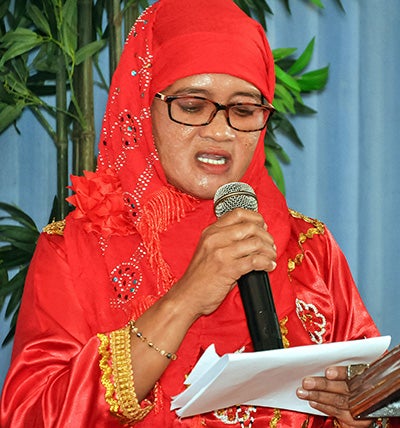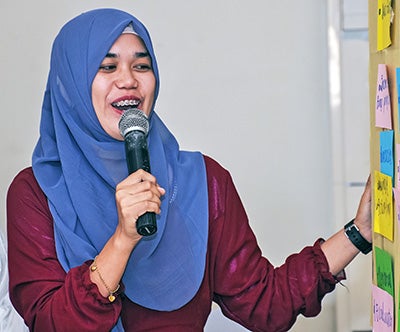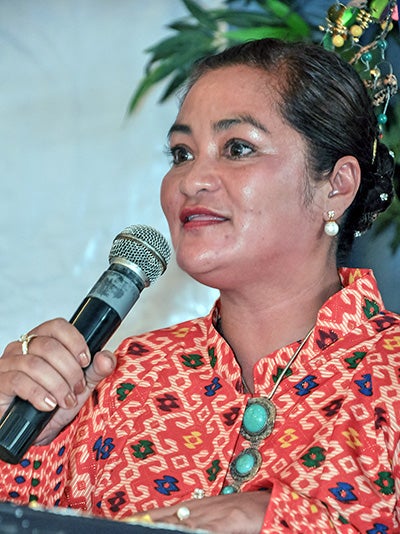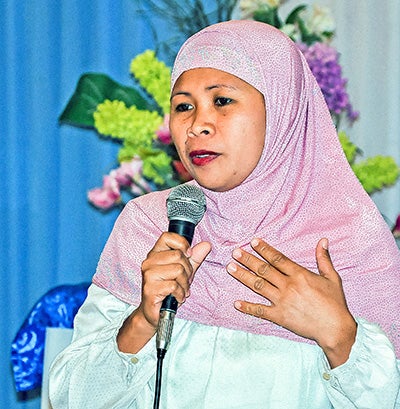Amplifying women’s voices, reclaiming women’s spaces in the Bangsamoro
Date:
Author: Maricel Aguilar
Cotabato City, Philippines – It was a reunion for the fifty-five Bangsamoro women leaders last 26-27 October in Cotabato City - women former combatants from the Moro Islamic Liberation Front (MILF) meeting with their sisters from the Moro National Liberation Front (MNLF); young women from the islands of Basilan, Sulu and Tawi-Tawi meeting those from Maguindanao, Lanao provinces and North Cotabato; and Badjao women of Basilan meeting the Tedurays of Maguindanao. These women drew, sang and acted out their lessons from the trainings and their experiences in developing their agenda and lobbying to their respective local officials.

“As a Badjao, I never thought that one day I will face our Governor and tell him our agenda and needs. Now, I felt equal with everyone else,” says Mary May Julhari, one of the women leaders trained on gender, peace and governance from the province of Basilan.
Jurfaida Abubakar recounted as she and some young women leaders organized a forum for 3rd and 4th year students in one of the higher education institutions in Tawi-Tawi: “When we began talking about the history of the Bangsamoro to other young women and men, they began challenging us. We realized then how difficult it is to create awareness among the youth, even among Moros, on who we are as a people.”

“I previously thought the struggle for a Bangsamoro was only for those who are in positions of power and authority. I did not care much in the past about what Bangsamoro is about; after the trainings, I realized that we are all connected… Thank you, UN Women, for helping me to see that this is not just other people’s struggle, it is my struggle too,” said Norjanna Dalid, a teacher in North Cotabato.
Aileen Hualde, a Teduray woman leader in Maguindanao said, “After the trainings, I was motivated to reach out to far-flung villages of my town in South Upi and do community work such as medical missions, feeding programs and distribution of hygiene packs and used clothing. After which, some people started to question if I was doing all these to run for public office later – why can’t other people realize that there are just some people who just care about their community?”

These women leaders were among the 213 women leaders capacitated by UN Women over the period of five months as part of building women’s capacities towards leadership and participation in the Bangsamoro, supported by the Peace Building Fund. Most, if not all, of these women find the trainings helpful in deepening their understanding of their roles as women – especially as women living in the Bangsamoro, caught in the midst of poverty, armed conflict and clan wars, and natural disasters. The trainings looked into women’s roles as leaders in their respective sectors and communities and how they navigated such role alongside their domestic and productive work. It also brought awareness and greater appreciation on the struggle of the Bangsamoro people towards peace – touching on the stories of historical injustices, human rights violations and marginalization of the Bangsamoro people.

After the trainings, the women leaders unanimously agreed to pursue actions to increase citizen awareness on the Bangsamoro among other actions relevant to their areas such as support to women’s livelihoods and continuing capacity development, addressing violence against women, and accessing their local gender budgets and claiming state accountability for its utilization.
In 28 October, these women leaders faced and presented their respective needs and agenda to the Autonomous Region in Muslim Mindanao (ARMM) Regional Government. For some, it was the fruition of their dream to finally face their leaders in the ARMM; for most, it was just a beginning of their new journey as enlightened and empowered Bangsamoro women.
This project with the women leaders of Bangsamoro, supported by the Peace Building Fund, is the contribution of UN Women to the implementation of the Comprehensive Agreement on the Bangsamoro (CAB), one of the most celebrated peace agreements in the world. This peace agreement was the first ever signed by a woman chief negotiator from the government, Miriam Coronel-Ferrer, and participated in by a Moro woman also in the government peace panel, Yasmin Busran-Lao. Aside from this, it included gender-sensitive provisions, providing the backdrop for women’s participation and encouraging women’s voices and leadership in the transition processes and in preparation for the establishment of the new Bangsamoro political entity.